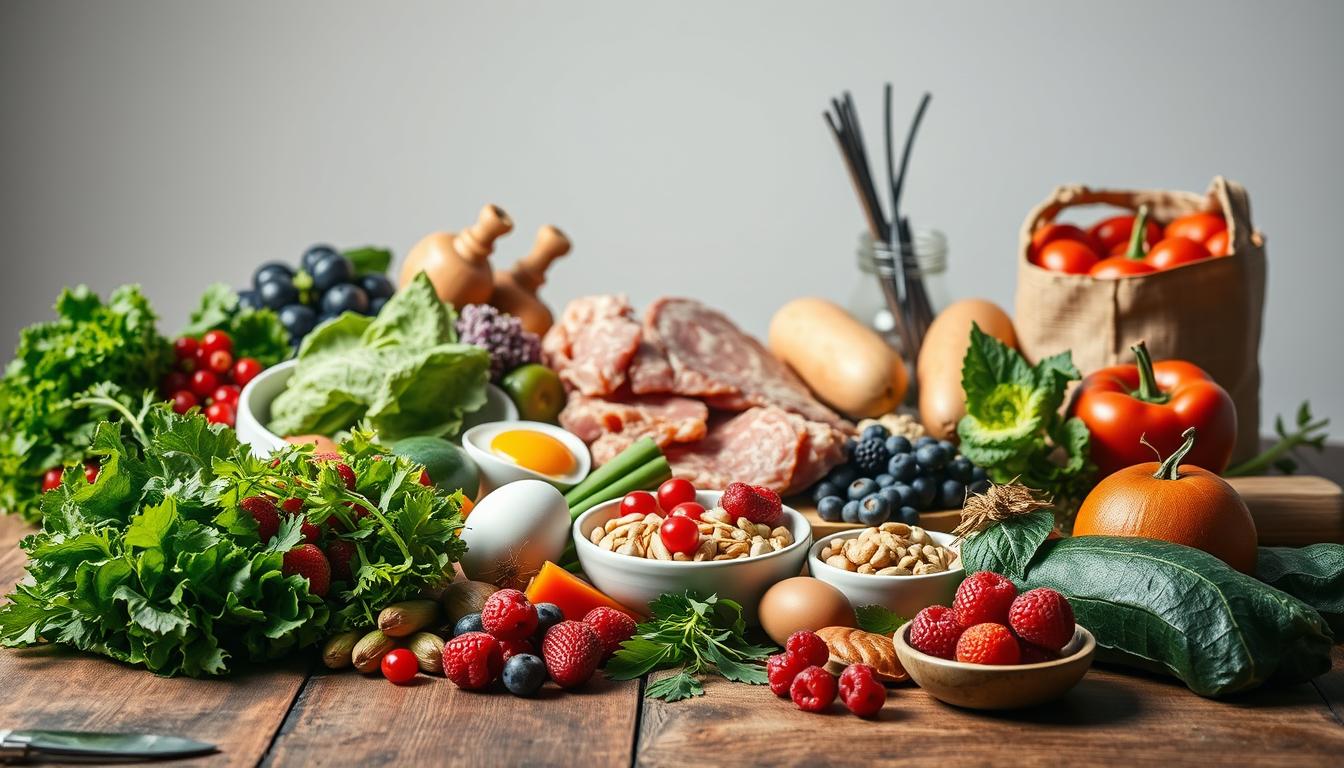Eating the right foods can significantly improve men’s health, boosting overall well-being and addressing specific health concerns. A well-balanced diet is crucial for maintaining optimal health, and certain nutrients play a vital role in supporting men’s health.
A diet rich in essential nutrients can help mitigate the risk of chronic diseases and support physical and mental performance. By incorporating the right foods into their diet, men can take a proactive approach to their health and well-being.
Key Takeaways
- Importance of a balanced diet for men’s health
- Nutrients that support men’s overall well-being
- Foods that can help mitigate chronic diseases
- Tips for incorporating healthy foods into daily meals
- Role of nutrition in supporting physical and mental performance
Understanding Men’s Nutritional Needs
Understanding the nutritional requirements of men is vital for promoting overall health and well-being. A healthy diet for men is crucial for maintaining optimal health and preventing chronic diseases.
Men have different nutritional needs compared to women, largely due to differences in body composition and hormone levels. Ensuring adequate intake of essential nutrients is key to supporting men’s health.
Key Nutrients Men Require Daily
Men require a variety of nutrients to maintain optimal health. Among these, certain nutrients play a particularly significant role.
Zinc, Magnesium, and B Vitamins
Zinc is crucial for testosterone production and overall reproductive health. Magnesium supports muscle and nerve function, while B vitamins are essential for energy production and heart health.
Antioxidants and Fiber Requirements
Antioxidants, such as vitamins C and E, help protect cells from damage, reducing the risk of chronic diseases. Adequate fiber intake is also vital for digestive health and satiety.
How Nutritional Needs Change with Age
Men’s nutritional needs evolve with age. For instance, older men may require more calcium and vitamin D to support bone health, while younger men may need more protein to support muscle growth and repair.
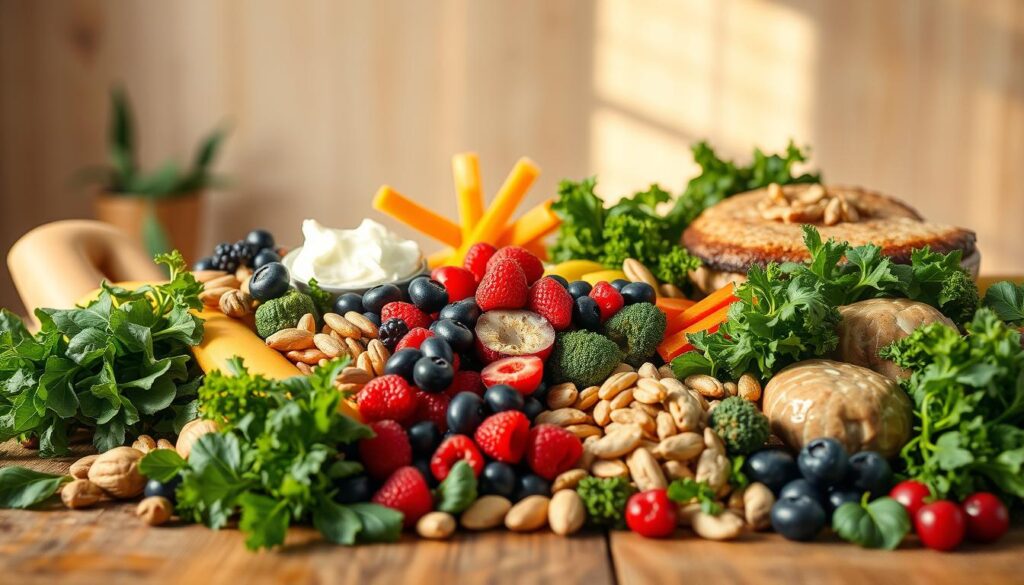
Best Foods for Men’s Heart Health
Maintaining heart health is crucial for men’s overall wellness, and diet plays a significant role in achieving this. A well-balanced diet rich in specific nutrients can help support cardiovascular health and reduce the risk of heart disease.
Omega-3 Rich Fish and Seeds
Omega-3 fatty acids are essential for heart health, helping to reduce inflammation and improve blood lipid profiles. Foods rich in omega-3s are crucial for men’s heart health.
Salmon, Mackerel, and Flaxseeds
Fatty fish like salmon and mackerel are among the richest sources of omega-3 fatty acids. Additionally, flaxseeds are a plant-based source of omega-3s, making them an excellent option for those who don’t consume fish. These foods help in reducing triglycerides and lowering blood pressure.
How to Incorporate Them Daily
Incorporating omega-3 rich foods into your diet can be simple. Try adding flaxseeds to your breakfast cereal or yogurt, and include salmon or mackerel in your meals at least twice a week. You can grill, bake, or poach fish for a healthy meal.
Potassium-Packed Options for Blood Pressure Control
Potassium is another crucial nutrient for heart health, helping to control blood pressure. Including potassium-rich foods in your diet can support overall cardiovascular wellness.
Bananas, Avocados, and Sweet Potatoes
Foods like bananas, avocados, and sweet potatoes are rich in potassium. These foods help counteract the effects of sodium and can lower blood pressure.
Heart-Healthy Meal Ideas
Creating heart-healthy meals can be delicious and easy. Try making a salad with avocado, or baking sweet potatoes as a side dish. You can also make a smoothie with bananas and a splash of low-fat milk for a quick and nutritious drink.
| Food | Nutrient | Benefit |
|---|---|---|
| Salmon | Omega-3 | Reduces Inflammation |
| Bananas | Potassium | Controls Blood Pressure |
| Avocados | Potassium, Healthy Fats | Supports Heart Health |
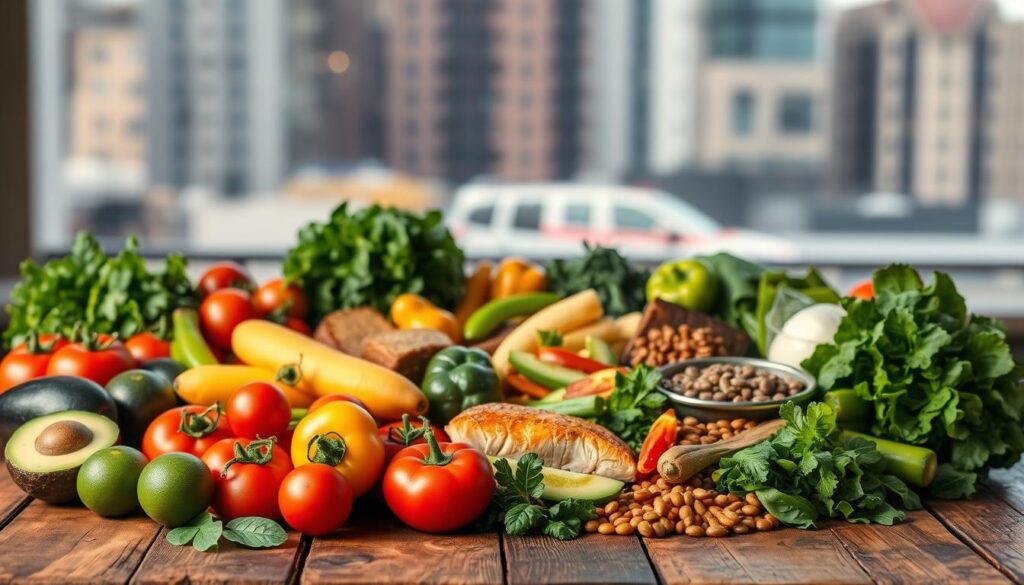
Muscle-Building and Performance-Enhancing Foods
Optimizing your diet with the right foods is crucial for men looking to enhance their muscle mass and overall physical performance. A well-structured nutrition plan supports muscle growth, boosts energy levels, and aids in recovery after workouts.
Complete Protein Sources for Optimal Muscle Growth
Protein is a fundamental nutrient for muscle repair and growth. Men looking to build muscle should focus on consuming complete protein sources that provide all essential amino acids.
Lean Meats, Eggs, and Plant Proteins
Including lean meats like chicken, turkey, and lean beef in your diet provides high-quality protein. Eggs are another versatile and protein-rich food. For those preferring plant-based options, legumes, lentils, and quinoa are excellent sources of protein.
Timing Your Protein Intake
The timing of protein intake is crucial for maximizing muscle growth. Consuming protein within an hour after a workout, often referred to as the “anabolic window,” can significantly enhance muscle recovery and growth. Additionally, spreading protein intake throughout the day helps maintain a positive nitrogen balance, supporting muscle synthesis.
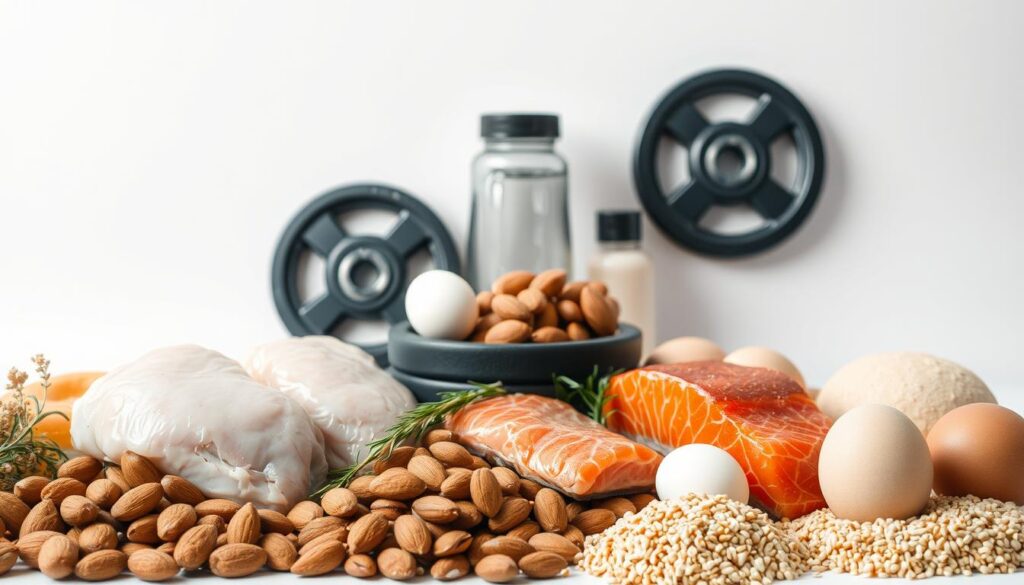
Complex Carbohydrates and Healthy Fats for Energy
While protein is vital for muscle growth, complex carbohydrates and healthy fats are essential for providing the energy needed for workouts and daily activities.
Whole Grains and Nuts
Whole grains like brown rice, oats, and whole wheat bread are rich in complex carbohydrates, providing sustained energy. Nuts and seeds, such as almonds and chia seeds, are not only good sources of healthy fats but also provide a boost of protein and fiber.
Pre and Post-Workout Nutrition
Proper nutrition before and after workouts can significantly impact performance and recovery. Consuming a mix of carbohydrates and protein before a workout can enhance energy levels, while a post-workout meal or shake with protein and carbs aids in recovery and muscle growth.
The Best Food for Men’s Health: Hormone-Balancing Options
Achieving hormonal balance is crucial for men’s health, and diet plays a significant role in this process. Hormonal imbalances can lead to a variety of health issues, including low testosterone, which can affect energy levels, muscle mass, and overall well-being. Fortunately, certain foods can help support hormonal balance, particularly testosterone production.
Foods That Support Testosterone Production
Testosterone is a key hormone in men, influencing muscle mass, bone density, and sex drive. Certain foods have been shown to support testosterone production.
Oysters, Egg Yolks, and Cruciferous Vegetables
Foods rich in zinc, such as oysters, are known to boost testosterone levels. Egg yolks are another testosterone-supporting food, thanks to their high content of vitamin D and cholesterol, which are essential for hormone production. Additionally, cruciferous vegetables like broccoli and cauliflower help support the body’s natural detoxification processes, which can also impact hormone balance.
Foods to Limit for Hormonal Balance
Just as some foods can support hormonal balance, others can disrupt it. It’s essential to limit or avoid foods high in sugar and processed foods, as they can lead to insulin resistance and hormonal imbalances. Reducing soy intake is also recommended, as excessive soy consumption has been linked to lower testosterone levels.
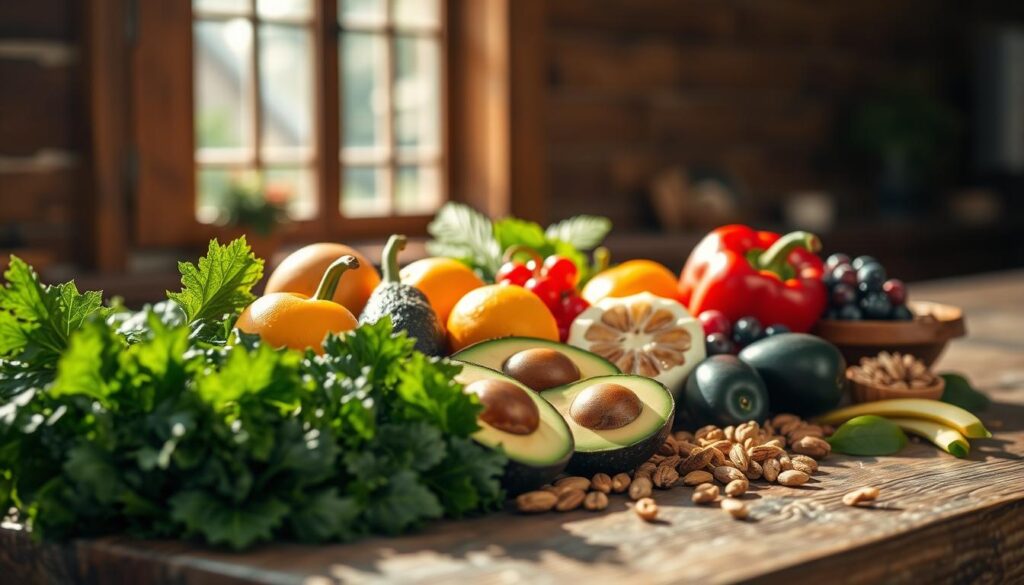
Stress-Fighting Foods for Hormonal Health
Stress can significantly impact hormonal balance, particularly cortisol levels, which in turn can affect testosterone. Incorporating stress-fighting foods into your diet can help mitigate this effect.
Dark Chocolate, Green Tea, and Adaptogenic Herbs
Dark chocolate contains flavonoids, which can help reduce stress. Green tea is rich in L-theanine, an amino acid that promotes relaxation. Adaptogenic herbs like ashwagandha and rhodiola can also help the body adapt to stress, supporting hormonal balance.
Creating a Stress-Reducing Meal Plan
To create a stress-reducing meal plan, focus on incorporating a variety of whole foods, including fruits, vegetables, lean proteins, and healthy fats. Meal planning can also help reduce daily stress by ensuring that healthy meals are readily available.
Disease-Fighting Superfoods Every Man Should Eat
Incorporating superfoods into your diet can be a game-changer for men’s health, offering protection against various diseases. A diet rich in nutrients can help men maintain optimal health and prevent chronic conditions. In this section, we will explore some of the most beneficial superfoods that men should include in their diet.
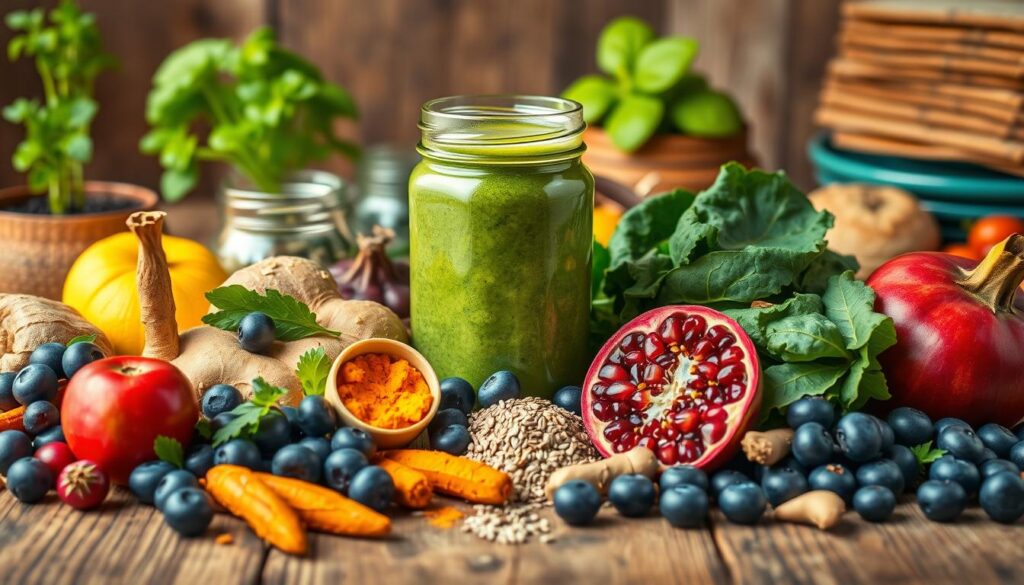
Cancer-Prevention Powerhouses
Certain foods have been shown to have a significant impact on cancer prevention. These include foods rich in antioxidants and other nutrients that help protect cells from damage.
Tomatoes, Berries, and Turmeric
Tomatoes are rich in lycopene, an antioxidant that has been linked to reduced risk of certain cancers. Berries, such as blueberries and raspberries, are packed with antioxidants and have been shown to have anti-cancer properties. Turmeric contains curcumin, a compound with potent anti-inflammatory and antioxidant effects.
Daily Servings for Maximum Benefit
To reap the benefits of these cancer-fighting foods, men should aim to include them in their daily diet. Consuming a variety of fruits and vegetables, along with spices like turmeric, can help maximize the anti-cancer effects. Aim for at least five servings of fruits and vegetables per day.
Foods That Support Prostate and Digestive Health
In addition to cancer prevention, certain superfoods can also support prostate and digestive health. These foods are rich in nutrients and compounds that promote overall well-being.
Pumpkin Seeds, Saw Palmetto Berries, and Fermented Foods
Pumpkin seeds are a rich source of zinc, a mineral essential for prostate health. Saw palmetto berries have been traditionally used to support prostate health. Fermented foods, such as sauerkraut and kimchi, are rich in probiotics that support digestive health.
Creating a Prostate-Friendly Diet
To support prostate health, men should focus on consuming a balanced diet that includes foods rich in zinc, such as pumpkin seeds, and other nutrient-dense foods. Including fermented foods and saw palmetto berries can also be beneficial. A well-rounded diet combined with a healthy lifestyle can help support overall prostate health.
Conclusion: Building Your Optimal Men’s Health Diet
Creating a personalized diet plan is crucial for men’s health. By incorporating the foods discussed in this guide, individuals can support their overall well-being and reduce the risk of chronic diseases. A well-balanced diet that includes a variety of whole foods, such as omega-3 rich fish, potassium-packed fruits and vegetables, and complete protein sources, is essential for maintaining optimal health.
Effective men’s health meal planning involves making informed choices about the foods we eat. By focusing on nutrient-dense foods and limiting processed and high-sugar foods, men can support their heart health, muscle growth, and hormone balance. An optimal diet for men also includes stress-fighting foods and disease-fighting superfoods, which can help mitigate the risk of certain health conditions.
By applying the principles outlined in this guide, men can take control of their health and make informed decisions about their diet. A well-planned diet is a critical component of overall health, and by making a few simple changes, men can significantly improve their well-being and quality of life.
FAQ
What are the best foods for men’s heart health?
Foods rich in omega-3 fatty acids like salmon, mackerel, and flaxseeds, as well as potassium-packed options like bananas, avocados, and sweet potatoes, are excellent for maintaining a healthy cardiovascular system.
How can men support testosterone production through diet?
Consuming foods like oysters, egg yolks, and cruciferous vegetables can help support testosterone production. It’s also essential to limit foods that can disrupt hormonal balance.
What are some disease-fighting superfoods for men?
Tomatoes, berries, turmeric, pumpkin seeds, saw palmetto berries, and fermented foods are all superfoods that can help prevent diseases, including cancer and prostate issues.
How can men incorporate protein into their diet for optimal muscle growth?
Men can consume complete protein sources like lean meats, eggs, and plant proteins, and pay attention to timing their protein intake to support muscle growth and recovery.
What are some stress-fighting foods that can help with hormonal balance?
Dark chocolate, green tea, and adaptogenic herbs are all stress-fighting foods that can help support hormonal health. Creating a stress-reducing meal plan can also be beneficial.
How do nutritional needs change with age for men?
Men’s nutritional needs change with age, with different life stages requiring varying levels of essential nutrients like zinc, magnesium, B vitamins, antioxidants, and fiber.
What are some tips for meal planning to support men’s health?
Men can support their health by planning meals around whole grains, lean proteins, and a variety of fruits and vegetables, and by limiting processed and high-sugar foods.
